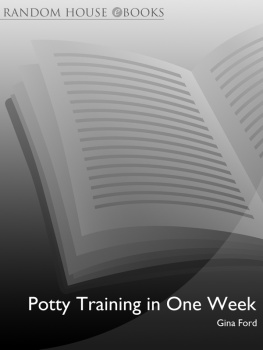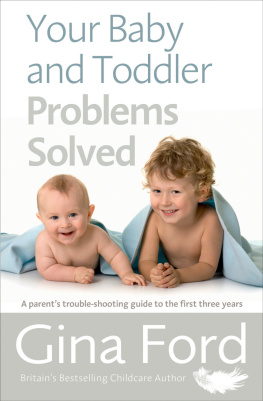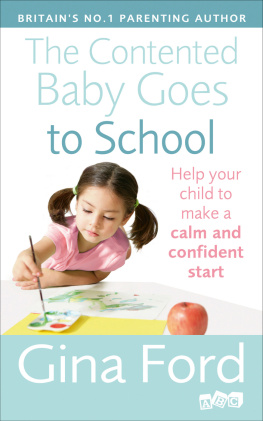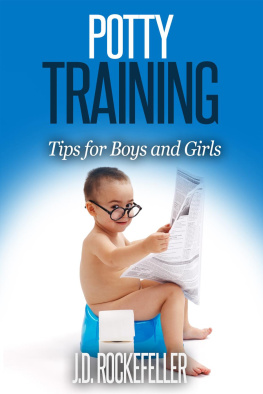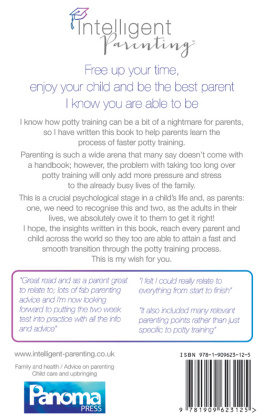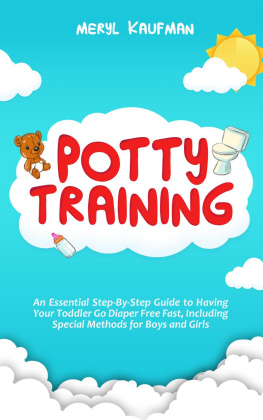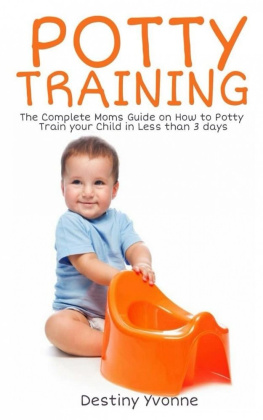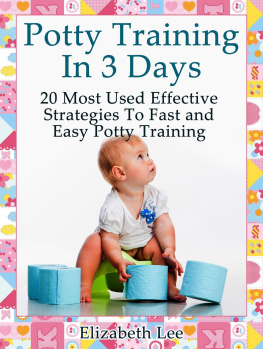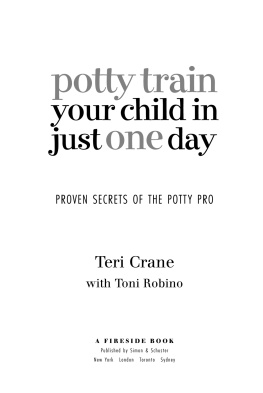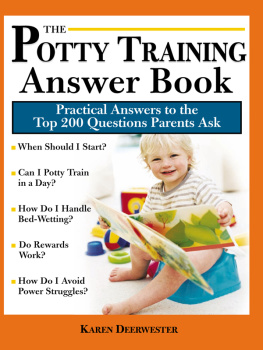Contents
About the Book
Many parents experience a long and bumpy ride along the road to a nappy-free existence. Advice on offer from grandparents, friends and professionals is often conflicting, leaving parents unsure of how and when to best potty train their child.
In Potty Training in One Week, bestselling author Gina Ford sets out a simple, easy-to-follow programme that works quickly and avoids many of the common pitfalls parents encounter.
This clearly organised book makes potty training easy, and even fun. Including updated information on:
How to know when your child is really ready
How to make potty training fun for your
How to reward
How to deal with accidents
What to do when you go out
What to do at sleep times
About the Author
Gina Ford is Britains bestselling childcare author. Her first publication, The Contented Little Baby Book, has sold over a million copies and continues to be a bestseller. Ginas wise counsel and extensive experience has enabled her to guide countless families through the early years of parenthood. She runs a hugely popular website, www.contentedbaby.com, and offers a consultation service for parents wanting specialist help with their babies and toddlers. She has published over twenty parenting books.
First Things First
Introduction
LIKE EVERY OTHER aspect of child care the advice given by experts on what age it is best to attempt potty training a child is deeply divided. This makes it very difficult for parents to judge whether their child is ready to give up nappies. Many care experts advise that the children should be left to decide when they are ready to come out of nappies. Others reckon that it is best to start putting a baby on the pot at regular intervals each day from as young as nine months. Nanny Smith advises that parents use a muslin nappy to tie their baby to spars of the playpen to support them while sitting on the pot. While these approaches may work for some children some of the time, none will work for all children all of the time. The main reason being that the key to successful potty training is not just about whether your child is ready to be potty trained but whether the parents and the rest of the family are ready. Even if a child is showing all the signs of being ready to give up nappies, potty training can end up in disaster if the parents are not ready. If followed to the letter my programme for potty training usually works within a week and avoids many of the usual pit-falls encountered by parents when potty training. As with all the other advice I give parents on baby and child care my opinions are formed from hands-on experience, actually working with a vast number of parents and their children.
What is potty training?
I BELIEVE THAT a child who has been successfully potty trained will know when he needs to use the potty or toilet and be capable of going to the potty or toilet by himself, pulling his pants down without assistance then using the potty or toilet and pulling his pants back up and washing and drying his hands. A child who has constantly to be reminded to use the potty and needs assistance with his clothes is in my opinion not truly potty trained. None of these tasks can be achieved until the child is able to control his bowel and bladder movements. The age at which this happens varies very much from child to child and attempting to start before the child has bladder control will certainly lead to many accidents and much frustration for both the child and the parents.
When to start
PARENTS FREQUENTLY ASK me what is the best age to start potty training. While all children are different, in my experience of working with hundreds of mothers and children, the majority are ready to be trained somewhere between the ages of 18 and 24 months. Before 18 months, very few childrens muscles are developed enough for the bladder control necessary for potty training. While we have all heard the stories from our mothers, aunties and grandmas, how in their day the baby was potty trained by the age of one year, the reality is that it was really the mother who was trained and not the baby. By sitting the baby on the potty at frequent times during the day she would, more often than not catch the urine or the bowel movement. While this obviously saved her the laborious task of washing and sterilizing the terry nappies used in those days, the baby could not be called potty trained in the true sense. I cannot stress too strongly that a toddler who is truly potty trained will recognise when he needs to pass urine or have a bowel movement and be capable of going to his potty, pulling down his own pants, and using the potty before pulling his pants up again. Often a child may be aware when he needs to do a pee or a poo but if he has not learned to dress and undress himself potty training could prove very difficult.
Signs to watch for
ONCE YOUR TODDLER reaches 18 months there are signs to watch out for that indicate he may be ready for Stage One of preparing for potty training. There are also certain levels of ability which your child should have reached to ensure successful potty training.
These important signs and levels of ability that will indicate if your toddler is ready to potty train are:
1 He is over 18 months of age.
2 His nappy is frequently dry when you get him up from his lunchtime nap. A dry nappy a couple of hours since his last nappy change would also be an indication that he is getting some bladder control.
3 He is aware when he is doing a poo, i.e. going very quiet and showing signs of concentration, or points to his nappy and says poo or pee pee when he has done one.
4 He can understand and follow simple instructions, i.e. go and fetch your red ball or put your toy in the box.
5 He is eager to participate in taking off his own clothes, i.e. shoes, socks and shorts, and understands what pulling his shorts up and down mean.
6 Can point to the different parts of his body when you name them, for example wheres your tummy button? or wheres your nose? etc.
7 He has the ability to sit still and occupy himself or concentrate for five to ten minutes with a toy, book or watching a video.
If your child were not showing all of the signs listed above I would not attempt Stage One. Even if his nappy is frequently dry after a couple of hours, it would be very difficult to train him if he was unable to sit still for more than a few minutes at a time, or does not obey simple requests. It would be advisable to work on his ability and wait for the right moment before attempting Stage One. Remember that the key to potty training quickly and successfully is to start when the child and parents are ready.
Encouraging co-operation
IF YOU ARE having trouble encouraging your child to participate in tasks such as dressing and undressing and helping to tidy his toys away I would suggest introducing a star chart. Then when he willingly co-operates with one of these tasks I would reward him with lots of praise and a star or sticker. Even if he doesnt fully understand the concept of the star chart, the number of stars or stickers each day on the chart will be a good indicator as to how co-operative he has been.
I also find it helpful to mark a cross in the box every time I request the child to do something and if they co-operate I cover the cross with a sticker. You can then tell at a glance how many of your requests he has completed willingly. Once you see several consecutive days where nearly all the crosses are covered with a sticker, and your child is showing all the other signs of being ready for potty training, I would try Stage One.

